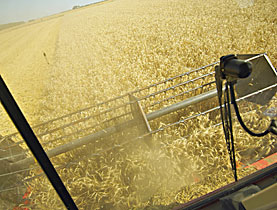Swiss may have to swallow bitter Doha pill

There's optimism in the air at the Geneva-based World Trade Organization (WTO), with chief mediators claiming a long-awaited global trade deal is now in sight.
Swiss negotiator Remigi Winzap said new documents on farming and industry were a “positive step” forward but warned the picture was not very rosy for Switzerland, which would have to make tough concessions on agriculture.
On Monday the WTO issued new agriculture and industrial goods proposals for a global trade agreement to be discussed at the next meeting of trade ministers. Negotiators are hoping to strike a deal by the end of the year.
The revised texts are the latest stage of the Doha Round of trade talks, launched in late 2001 but since then mired in wrangling between rich and poor nations. Its aim is to open up world trade and help developing countries.
“These revised negotiating texts illustrate clearly where convergence lies among the WTO members and where we have more work to do,” said WTO director-general Pascal Lamy. “We are getting closer to our end game.”
While progress seems to have been made on farming, industrial goods are more problematic and the timing of the trade ministers’ meeting remains uncertain.
“The chairs have done a great job in difficult circumstances,” said Winzap, who is head of the WTO Division at the State Secretariat for Economic Affairs (Seco) and chief negotiator on industrial products.
“On agriculture the number of brackets [unresolved questions] has been substantially reduced and there is a narrowing of positions in general, but there’s still a lot of work to do,” he told swissinfo.
“On industrial goods it’s more difficult; we have a structure, but positions are still apart and we don’t see how we can bridge them in the short term.”
Serious concerns
The latest texts propose an average 54 per cent cut in customs duties on agricultural imports in developed countries and 36 per cent in developing nations, and a reduction in farm subsidies of 75 or 85 per cent in the European Union and 66 or 73 per cent for Japan and the United States.
The new farm text is also reported to have made headway on “sensitive” products that countries could shield from a sharp fall in customs duties. Developed countries would be able to designate up to four or six per cent of their imported agricultural goods as sensitive while committing themselves to an overall quota for imported products.
In the industrial sector, some 30 emerging market countries would agree to reduce their customs duties to a maximum level of 19 to 26 per cent. The more the tariffs are lowered, the greater would be the right of governments to protect certain “sensitive” items.
Despite WTO’s optimism, several nations and business sectors have condemned the revised texts. India rejected them as “totally unacceptable” and accused rich nations of seeking to “divide and rule” developing countries on the issue of industrial product tariff cuts.
Canada said it had “serious concerns” about the farm proposal, especially the lack of progress on sensitive products. Brazil also said the texts required much work to serve as the basis for a possible ministerial meeting. The United States and European Union have yet to make official statements.
Give and take
The Swiss negotiator said negotiations had been “very tough”.
“Switzerland will have to make deep cuts in its high agriculture tariffs – up to 70 per cent of current levels – so it’s important that we also get concessions on industrial goods and on other issues,” explained Winzap.
“In agriculture we will not win a lot and we’ll have to pay, on industrial goods and services we don’t see what we get, and on other issues there is not much on the table either – that’s our problem.
“And we’ll probably have to sell the round to the Swiss people in a referendum, so it’s definitely not that rosy,” he added.
Next week negotiators will therefore begin a tricky bargaining phase on the basis of the new documents. WTO’s 152 member states have agreed to finish the round by the end of this year, before the negotiations run up against a change of US administration in 2009.
“Optimistic people may say it’s possible [to conclude the Round] before the end of the year, I would say more likely we will run into 2009,” said Winzap.
swissinfo, Simon Bradley in Geneva
Launched in the Qatari capital in November 2001, the WTO’s latest liberalisation talks known as the Doha Round have struggled to overcome many countries’ fears of exposing sensitive agricultural and manufacturing industries to more competition.
The negotiations have been snared in disagreement and broke down in July 2006.
However, the key elements in an overall deal are now relatively clear. The United States would cut its farm subsidies, blamed by poor countries for squeezing their farmers out of the market.
The European Union would open its protected market for food by cutting agricultural tariffs, giving developing country food exporters such as Brazil new opportunities.
And developing countries would cut their industrial tariffs, opening their markets to manufacturers in rich countries. Other elements would include a boost to trade among developing nations and liberalization of services such as banking and telecoms.
Developing countries want waivers to tariff cuts to protect their subsistence farmers and fledgling industries, while rich nations say they cannot sell the sacrifices being asked of them unless they can point to gains in market access elsewhere.

In compliance with the JTI standards
More: SWI swissinfo.ch certified by the Journalism Trust Initiative












You can find an overview of ongoing debates with our journalists here . Please join us!
If you want to start a conversation about a topic raised in this article or want to report factual errors, email us at english@swissinfo.ch.